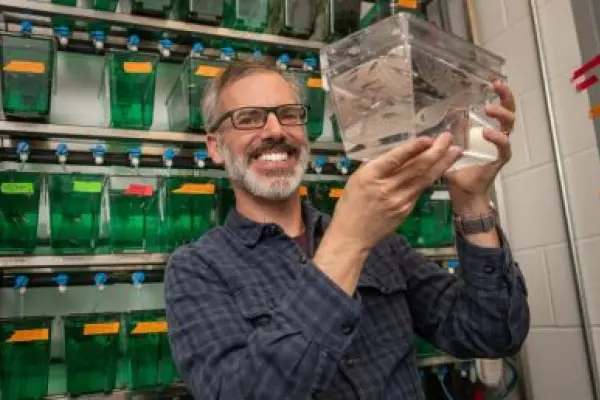
Posner receives grant from National Eye Institute to continue lens research
ASHLAND, Ohio – Mason Posner, Ph.D., the Trustees’ Distinguished Professor of Biology at Ashland University, recently secured a $300,000 grant from the National Eye Institute of the National Institutes of Health to advance his ongoing research on eye lens development.
This latest study will center on cell remodeling, eye lens transparency and cataract prevention. The project will use zebrafish, small tropical fish that build their lens in a similar way to humans, to characterize the roles that novel genes play in regulating eye lens development.
The proposed experiments will address open questions about how lens cells lose their nuclei and organelles to produce the transparency of the lens and prevent cataract—the leading cause of human blindness—while also adding to the general understanding of how cells remodel themselves in diverse tissues.
“We believe that this research is important because it explores how the lens of the eye forms and how it stays clear as we age,” Posner explained. “Cloudiness of the lens, called cataracts, is the leading cause of human blindness worldwide. We use the zebrafish as a cost-effective tool to better understand how the lens grows and functions. The results of this research provide a better basic understanding of the lens that informs possible future prevention and treatment for cataracts.”
A number of AU undergraduate students will gain valuable experience by conducting research during this project. They will be using innovative genome manipulation, molecular biology, bioinformatic and cell visualization techniques while conducting these studies.
“These research experiences are an important part of these students’ science training, helping them to obtain laboratory-based employment after graduation, entrance to master’s and Ph.D. programs and acceptance to health-related professional programs like medical and physician assistant schools,” said Posner, a member of the AU faculty since 1999.
Posner, with assistance from more than 50 undergraduate students whom he has mentored over the years, has used grant funding to do ground-breaking research on the development of the ocular lens by studying zebrafish. By investigating the evolution and biological role of lens proteins, specifically alpha crystallins, his lab has made and will continue to make significant contributions to understanding the basis of cataracts.
For more information, visit Posner’s website at masonposner.com or view his latest publication at sciencedirect.com.
Ashland University is a mid-sized, private university conveniently located a short distance from Akron, Cleveland and Columbus, Ohio. Ashland University (www.ashland.edu) values the individual student and offers a unique educational experience that combines the challenge of strong applied academic programs with a faculty and staff who build nurturing relationships with their students.